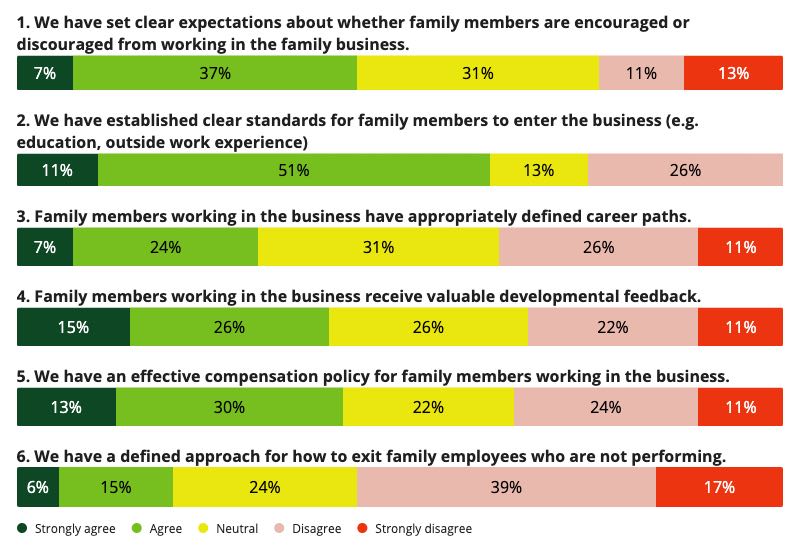Family businesses cite large gaps in their family employment policy
For many family business owners, having a child (or another relative) thriving in the family business is one of the biggest payoffs of all. After all, who will care more about seeing a family employee become a successful business leader? But having relatives work in the family business is complicated. And it can be made infinitely more complicated when a family doesn’t have an explicit Family Employment Policy. We have found that an effective policy can help to significantly reduce conflict over family employment issues.
In our recent “flash poll” we found that while many families have some form of Family Employment Policy, they haven’t covered all the bases. In fact, the gaps can be seen as warning lights – potential for conflict lies ahead. Here’s what we found:

On the positive side, most family businesses do a good job of setting standards for entering the business, such as educational degrees or prior work experience (62% strongly agree or agree). For example, one respondent said, “We require family members to be successful working for another employer for at least five years before any family member can come to work in our family business.” Putting these standards in place helps set expectations for family members and can reduce disagreements over who should be allowed into the business.
However, most do not rate themselves as highly when it comes to supporting family members once they are in the business. Only 21% believe they have established clear career paths for family members, while less than half (41% strongly agree or agree) think that family members working in the business receive valuable developmental feedback. As one respondent described, “Our policy focused on joining. We have nothing that creates expectations for management or the family employee on career path and expectations for promotion. Are they expected to ‘fast track’ to the C suite or compete for openings with non-family members? What is the impact on non-family employee engagement (and retention) if they get ‘passed over’ for a promotion because it went to a family member?”
Without defined career trajectories and good feedback processes, family employees may struggle to reach their potential or be put into positions for which they are not prepared to succeed. Not only does this result in wasted family talent, but it can also cause dissatisfaction with the family business more broadly. One common approach is to put family members into the regular company tracks, at least for a time. As one respondent put it, “Treat them as another employee for at least the first 5 years; avoiding special treatment is key for them to gain acceptance and respect of non-family members.”
One of the biggest sources of family business conflict is compensation, which most respondents think needs more work. Less than half think they have an effective policy in place for how to compensate family members working in the business. A clearly understood policy can go a long way towards addressing the fairness concerns that compensation creates.
Finally, very few respondents (around 20%) have a defined approach for what to do when family members are not successful. Conversations about exit are tough to have, since no one wants to imagine a family member failing. But it does happen and a lack of a clear policy is especially risky, since when poorly managed, an exit from the business can also mean an exit from the family for a period of time.
Family employment can trigger many issues—fairness, legacy, favoritism— and the parents’ overriding desire to help their children, or at the same time, prevent them from becoming entitled. But the risks don’t have to stop your family from trying to make it work. By creating and implementing a clear family employment policy, family leaders can foster a healthy relationship between the business and family employees.
*Survey was conducted in April 2021 with a total of 59 respondents.
Originally published on LinkedIn on 27 May 2021